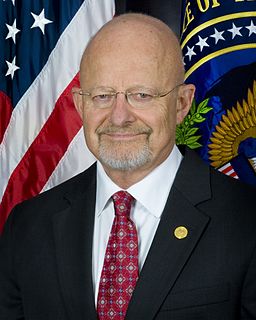A Quote by James Clapper
The reason that ISIL was so successful, yes, it had to do with their capabilities and prowess on the battlefield, but they were dealing with a receptive constituency in northern Iraq because of the intense hatred of the Maliki government, which of course is imposing the Shia view on them.
Related Quotes
Now let's make two things clear: ISIL is not 'Islamic.' No religion condones the killing of innocents, and the vast majority of ISIL's victims have been Muslim. And ISIL is certainly not a state. It was formerly al Qaeda's affiliate in Iraq, and has taken advantage of sectarian strife and Syria's civil war to gain territory on both sides of the Iraq-Syrian border. It is recognized by no government, nor the people it subjugates. ISIL is a terrorist organization, pure and simple. And it has no vision other than the slaughter of all who stand in its way.
And on this issue of the Shia in Iraq, I think there's been a certain amount of, frankly, Terry, a kind of pop sociology in America that, you know, somehow the Shia can't get along with the Sunni and the Shia in Iraq just want to establish some kind of Islamic fundamentalist regime. There's almost no evidence of that at all. Iraq's always been very secular.
American airstrikes...create risks, especially if our intelligence there is rusty. The crucial step, and the one we should apply diplomatic pressure to try to achieve, is for Maliki to step back and share power with Sunnis while accepting decentralization of government. If Maliki does all that, it may still be possible to save Iraq. Without that, airstrikes would be a further waste in a land in which we've already squandered far, far too much.
Most victims of ISIL are, in fact, Muslims. So it seems to me that to refer to ISIL as occupying any part of the Islamic theology is playing on a - a battlefield that they would like us to be on. I think that to call them - to call them some form of Islam gives the group more dignity than it deserves, frankly.
Today, we are tabling a motion seeking the support of the House for the Government's decision to renew our military mission against ISIL for up to an additional 12 months. Our objectives remain the same: we intend to continue to degrade the capabilities of ISIL, that is, to degrade its ability to engage in military movements of scale, to operate bases in the open, to expand its presence in the region, and to propagate attacks outside the region.
Anytime you're dealing with moral issues, in a government position, you're dealing with some sticky stuff because everybody's morality is different. So you may be a Christian and say "my morality is based on the Bible." But if it doesn't line up with the way they think it should line up, now you got a problem with them. And then you can say, "I'm more in line with the Bible," but you don't care about the Bible, so they are like 'why are you imposing these difficult rules on me? I don't even believe in that.' So you just have an interesting and sticky situation.



































